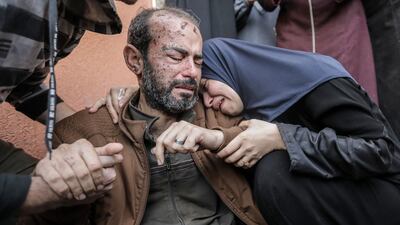Live updates: Follow the latest news on Israel-Gaza
Israel continued its bombardment of the Gaza Strip on Sunday as Hamas gunmen battled Israeli forces trying to push into Gaza's Jabalia refugee camp.
At least 11 Palestinians were killed by an Israeli air strike on a house in the camp, the largest in the enclave, medics told Reuters.
Witnesses reported heavy fighting between Hamas and Israeli forces trying to advance into Jabalia, the largest of Gaza's camps with about 100,000 people.
Palestinian medics said scores of civilians have been killed in Israeli bombardments of Jabalia, a poor and crowded district that grew out of a camp for Palestinian refugees from the 1948 Israeli-Arab war. Israel claims the strikes have killed many militants in the area.
Israel's military on Sunday urged residents of several Jabalia neighbourhoods to evacuate towards south Gaza "to preserve your safety" and that it would pause military action from 10am to 2pm.
After the "pause" period expired, 11 Palestinians in Jabalia were killed by an air strike on a house, the enclave's Health Ministry said.
It came the day after the World Health Organisation began evacuating patients from Gaza's Al Shifa hospital, as the UN body issued dire warnings that the territory's largest medical complex is now a “death zone”.
More than 12,000 Palestinians have been killed in 44 days of conflict.
The Ministry of Health in Gaza said last week that it was becoming impossible to count fatalities as all hospitals are out of service, with many either having been bombed or caught up in fighting during Israel's ground offensive.
Israeli forces have been targeting the Al Shifa complex, claiming that is a command centre for Hamas, the militant group that controls Gaza and that launched an unprecedented attack on Israel on October 7.
The WHO says 291 critically ill patients remain at the hospital under the care of 25 doctors. Hundreds of patients evacuated on Saturday from the hospital, which has a capacity of roughly 800 beds. That was quickly overwhelmed after October 7 as the number of injured in the conflict, which currently stands at over 30,000, rapidly climbed.
Gaza's Health Ministry also said that 30 premature babies were evacuated from Al Shifa and are en route to hospitals in Egypt.

The assault on the hospital has led to fears that Gaza's humanitarian crisis is about to get worse, as patients are forced to transfer to other hospitals that are already overcrowded.
Israel's security cabinet nonetheless reportedly approved the transfer of fuel into the besieged strip on Sunday, according to The Times of Israel.
Under the plan, 60,000 litres of fuel would enter the strip, well under the 600,000 litres that the UN said in October that it would require to operate critical centres.
Those services include the sewage system, water desalination plants and hospitals.
The decision comes despite intense criticism by some of Israeli Prime Minister Benjamin Netanyahu's ministerial colleagues.
Far-right National Security Minister Itamar Ben-Gvir and Finance Minister Bezalel Smotrich slammed the plan on Friday.

Mr Smotrich said it would be a “grave mistake [that] gives oxygen to the enemy”.
The decision to allow some humanitarian access to Gaza comes as speculation mounts that a pause in fighting and a partial lifting of Israel's blockade on the strip could be part of a deal to release Israeli female and child hostages. About half of the 240 hostages taken prisoner on October 7, hold foreign or dual nationality.
For now, a ceasefire remains a distant prospect. Over the weekend, Hamas fighters continued to launch pop-up attacks on Israeli soldiers in the heavily urbanised north including parts of Gaza city and the sprawling Jabalia and Beach refugee camps, according to Hamas and local witnesses.
Fighting, often at night or at dawn, is said to involve small groups of around 10 Hamas fighters attacking larger formations of Israeli forces, before retreating into underground tunnels, in battles that sometimes last seconds.
Hundreds, possibly thousands of Hamas fighters have been killed so far, but experts say the group still has significant fighting power left and will be extremely difficult to root out from its vast tunnel complexes. Nearly 60 Israeli soldiers have been killed.
Witnesses also reported heavy fighting overnight between Hamas gunmen and Israeli ground forces trying to advance into Jabalia, the largest of the enclave's camps with nearly 100,000 people, most of whom rejected Israeli appeals to evacuate to the south.
Jabilia has been hit several times with massive Israeli air strikes, with one attack on Friday killing at least 50 people sheltering in a UN-run school. Israel claims that a battalion of Hamas fighters is headquartered in the town.
The continuing fighting in northern Gaza suggests far more violence is imminent if the Israelis close in on southern towns such as Khan Younis, which has a population of 400,000, perhaps many more, due to the refugee crisis.
With additional reporting from Reuters


